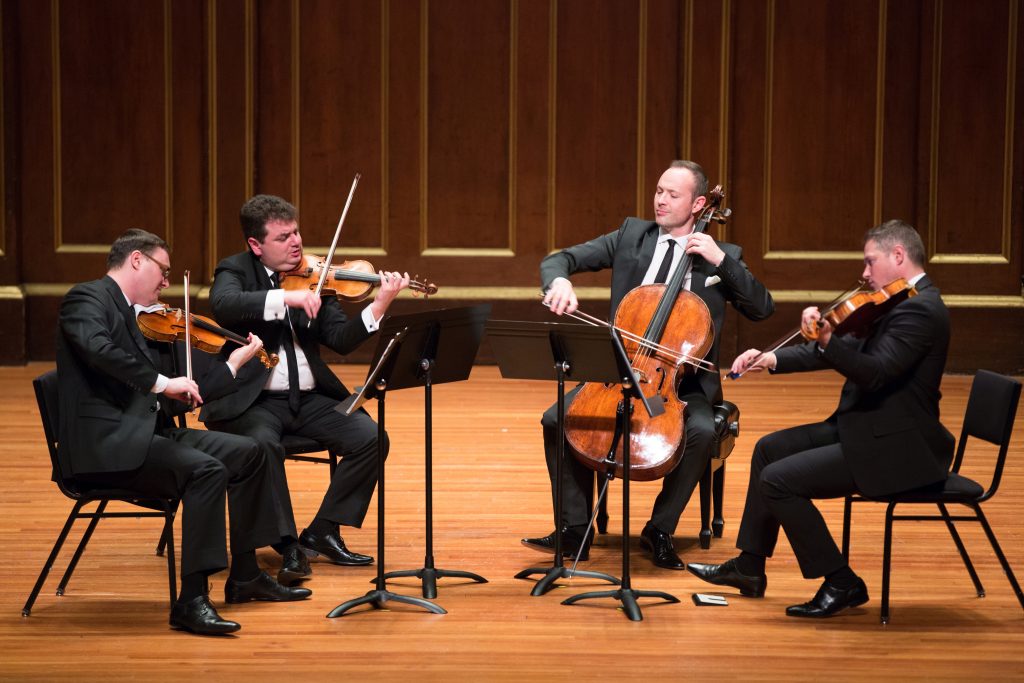Magnificent Jerusalem Quartet Opens Coming Home Festival in La Jolla’s Acoustically Miraculous Conrad Prebys Performing Arts Center
After a star-studded Grand Opening Weekend to inaugurate The Conrad, the La Jolla Music Society’s glistening new performing arts center in downtown La Jolla, on Tuesday (April 9) the organization presented the Jerusalem Quartet in the first full concert of the organization’s Coming Home Festival.

The Jerusalem Quartet [photo (c.) Felix Broede]
As a music critic, I assume my first calling is to write about Tuesday’s musical performance by the Jerusalem Quartet, but inasmuch as The Conrad will have such a profound effect nurturing music performance in La Jolla over the next 50 years, the potential of that contribution easily counterbalances a single performance, no matter how eloquent.
In short, The Conrad’s Baker-Baum Concert Hall provides a luxurious yet pellucid sonic experience even the most acoustically sophisticated new auditoria rarely approach. The vivid clarity of string sound throughout the range of the Jeruslam Quartet proved so astonishingly present—even in the rows towards the rear of the room—that it felt as if I were standing just a few feet in front of the string players. Even when cellist Kyrl Zlotnikov played quite softly, his lowest notes displayed a solid, focused fundamental tone that rarely escapes the edge of the stage of most comparably sized concert halls.
Thanks to the impeccable design of Nagata Acoustics, the sonic presence of the 513-seat Baker-Baum hall is unusually warm, allowing the music to bloom generously without so much as a hint of echo or distortion. I predict this quality of the room will easily become its most valuable calling card. To make comparisons to the other two excellent performance halls in the area, I would say that UC San Diego’s Conrad Prebys Concert Hall has equal sonic clarity and presence, but in comparison, its sound is cold, verging on clinical. Although the Auditorium at TSRI provides sonic clarity and more warmth that the UC San Diego room, because it is a smaller, narrower, and steeply raked room, several performers on its stage can easily produce a volume of sound that verges on oppressing the listener.
The design of Baker-Baum, the work of Epstein Joslin Architects, has provided a wonderfully high ceiling, and the shape of the room—a rectangular prism—along with its gently raked seating suffuses and sustains the sound for maximum audience appreciation. The subtle lighting design adds to the hall’s comfort, although the orange scallops along the edge of the ceiling contrast a bit too vividly with the deep azure hue that back lights the walls around the audience.
Could the La Jolla Music Society have chosen a more winning ensemble than the Jerusalem Quartet to launch its Coming Home Festival? Opening with Haydn’s G Major String Quartet, Op. 76, No. 1, these four players immediately impressed with an explosion of jovial counterpoint rendered with astonishing precision and ensemble focus. As they played with the composer’s quicksilver dynamic surprises, they took immediate advantage of the room’s sonic clarity. Highlights of this elegant offering included the rich timbre of first violinist Alexander Pavlovsky’s florid solo lines that sailed over crystalline pizzicato accompaniment in the Menuetto, the hushed, hymn-like serenity of the opening of the Adagio, and the ensemble’s barely concealed aggressive drive that propelled the final movement.
An account of Debussy’s G Minor String Quartet that is not impassioned is not Debussy. The Jerusalem Quartet, however, managed to communicate the composer’s contained fury in a consistently glowing, transparent sonority throughout, like a sciricco that blows across the plain yet manages to leave everything standing in place. They shaped the composer’s unpredictable themes with command and assurance that implied a logic that might have surprised even the composer.
As the Scherzo opened with unsettling pizzicato turbulence, violist Ori Kam offered a fevered, powerful solo vested in one of the most sensual viola timbres I have ever heard. Kam’s soulful solo theme in the Andantino was answered with equal poignancy by second violinist Sergei Bresler. Cellist Zlotnikov evoked wistful nostalgia as the Andantino drew to a close, and the movement’s delicate pianissimo final cadence was nothing short of breathtaking. When the Jerusalem Quartet was taking a curtain call after their Debussy performance, it occurred to me that I had not been so swept off my feet by a string quartet since I heard England’s Arditti Quartet at UC San Diego in the 1980s.
The quartet devoted the second half of their program to Beethoven’s String Quartet in E-flat Major, Op. 127. The virtues they brought to the opening Haydn G Major Quartet easily expanded to the more eccentric demands of Beethoven and provided equally sumptuous results.
This concert was presented by the La Jolla Music Society in the Conrad Prebys Performing Arts Center in La Jolla on Tuesday, April 9, 2019. The Society’s Coming Home Festival continues with eight more concerts in April and six more in May in this venue.
